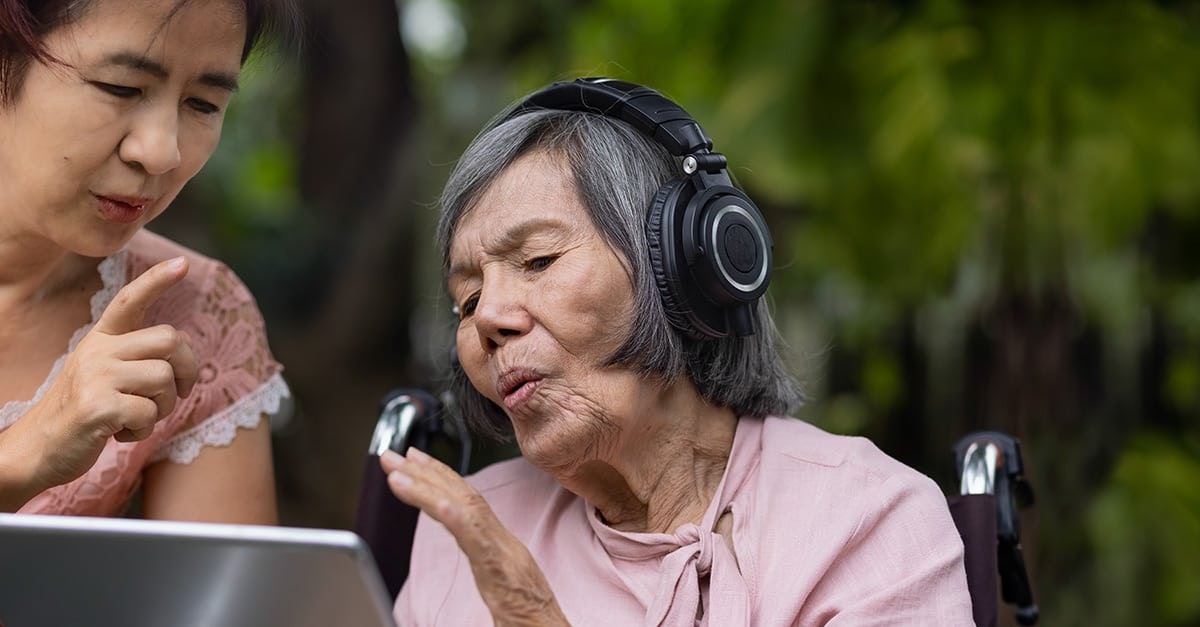
The Role of Art & Music for Patients with Dementia and their Families
Visual art, music, and literature make the world we live in worthwhile. Enjoying the Arts enriches people’s lives with dementia and gives them a creative outlet to express their emotions.
Can you imagine not being able to listen to your favorite song? What would the walls of your home look like without your favorite artwork? These things not only enhance our daily lives, but they can also provide much-needed pleasure and respite to patients with dementia.
Recent scientific studies have explored the powerful benefits of art and music therapy on individuals with dementia. MJHS Health System believes in the documented power of art and music to help our patients.
We’ve prepared this post to explain why.
How Can Music and Art Help Patients with Dementia?
Happiness is built through connection. When you struggle to communicate, it’s essential to find new ways to express yourself. Music and visual art allow patients with dementia to engage and communicate with others, even as their condition progresses.
Music and Dementia Patients
How do music and art bring joy, enhance communication, and increase engagement?
Music profoundly impacts our emotions. Imagine how your favorite song makes you feel. Singing along to a favorite tune or listening to the song you danced to at your wedding can bring joy even in difficult times. Music connects us, our memories, and our emotions. Today’s Geriatric Medicine documents that music therapy may help reduce agitation and improve patient behavior.
How to implement music into daily life for people with dementia:
- Play your loved one’s favorite music for them. Let them pick if they can. If not, play something you know they like or a popular song from their youth. Tell them stories about the song they played.
- Pick music to change the mood. Is it time to relax? Choose something soothing. Pick a joyful song if you want an uplifting moment. You can add seated movements, simple props or clap.
- Sing and encourage your loved one to sing along—schedule listening to music or singing favorite songs simultaneously each day.
Art and Dementia Patients
Making visual art to connect and communicate.
Drawing or painting with easy-to-use implements gives patients with dementia the freedom to create and express themselves without words. They can communicate a whole world with just shapes and colors. Completing a show project can give patients with dementia a sense of accomplishment and serve as a tangible reminder of a feeling, emotion, or memory.
Art projects to try:
- Provide a range of tools and let your family member choose their medium. They may enjoy painting, drawing, or modeling with clay. Choose objects that are easy to manipulate but avoid crayons or other implements designed for young children. Watercolors, pastels, and thick charcoal pencils work well.
- Ask about their creation. Why did they choose the colors they used? If they draw a landscape, what does it remind them of? If not, what did they feel while they were drawing? Conversations about their composition can keep people with dementia or patients with dementia interested.
A 2018 study showed that art therapies might help slow the progression of dementia and address many of the symptoms that impact a patient’s quality of life and mental well-being. Making visual art and music accessible to patients with dementia and their families allows everyone to communicate, share memories, and stay engaged.
How Does the MJHS Keys to Dementia Care Campaign Benefit this Therapy?
The MJHS Keys to Dementia Care program supports music therapy by opening the world of music and music-making for patients and their families. We train staff on music-assisted care techniques to decrease negative symptoms of dementia and enhance our patients’ quality of life.
If you need more information on how art and music can help patients with dementia or how you can help support the MJHS Keys to Dementia Care program, our staff of caregivers is ready to help.
At MJHS, we value both personal and professional caregivers and recognize the critical work you do. That is why we have created these online caregiving resources to help you through this crucial time in your life.
If you need additional help and support caring for your loved one, please feel free to contact MJHS. We can recommend other care options available to you through one of our programs.